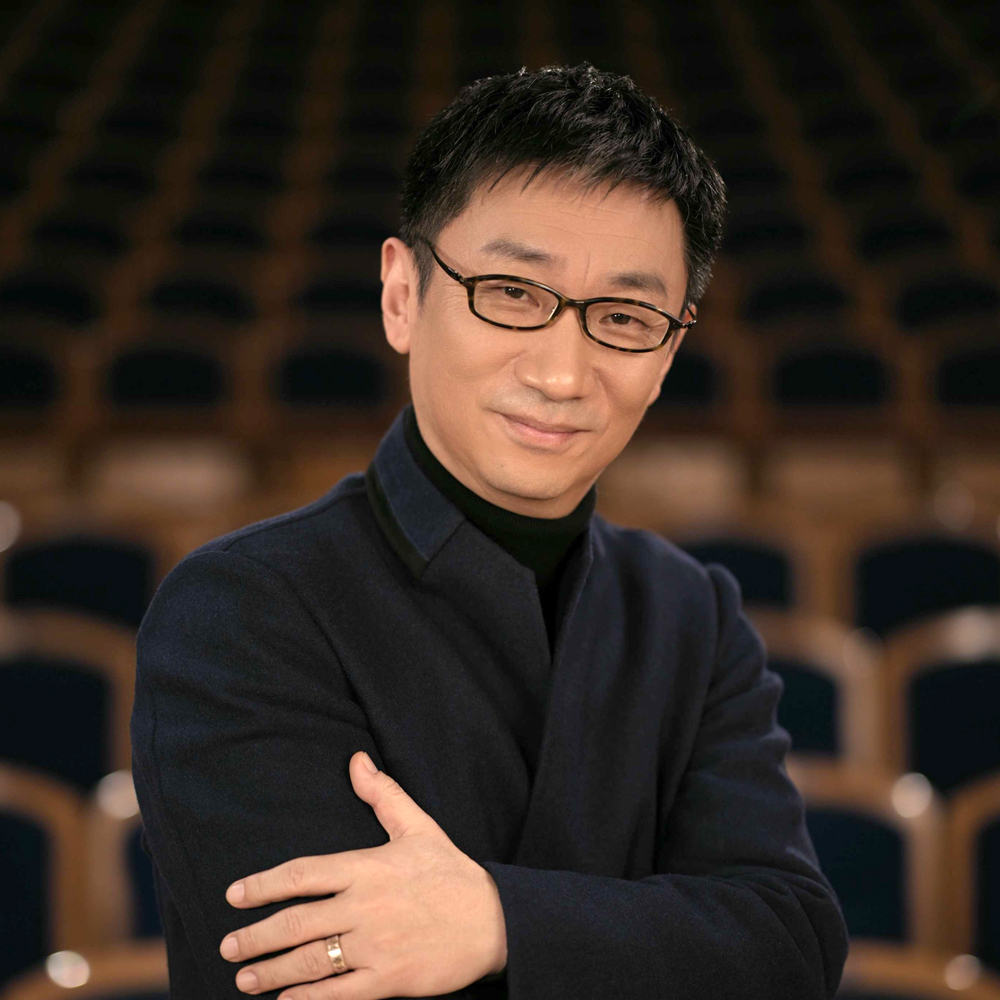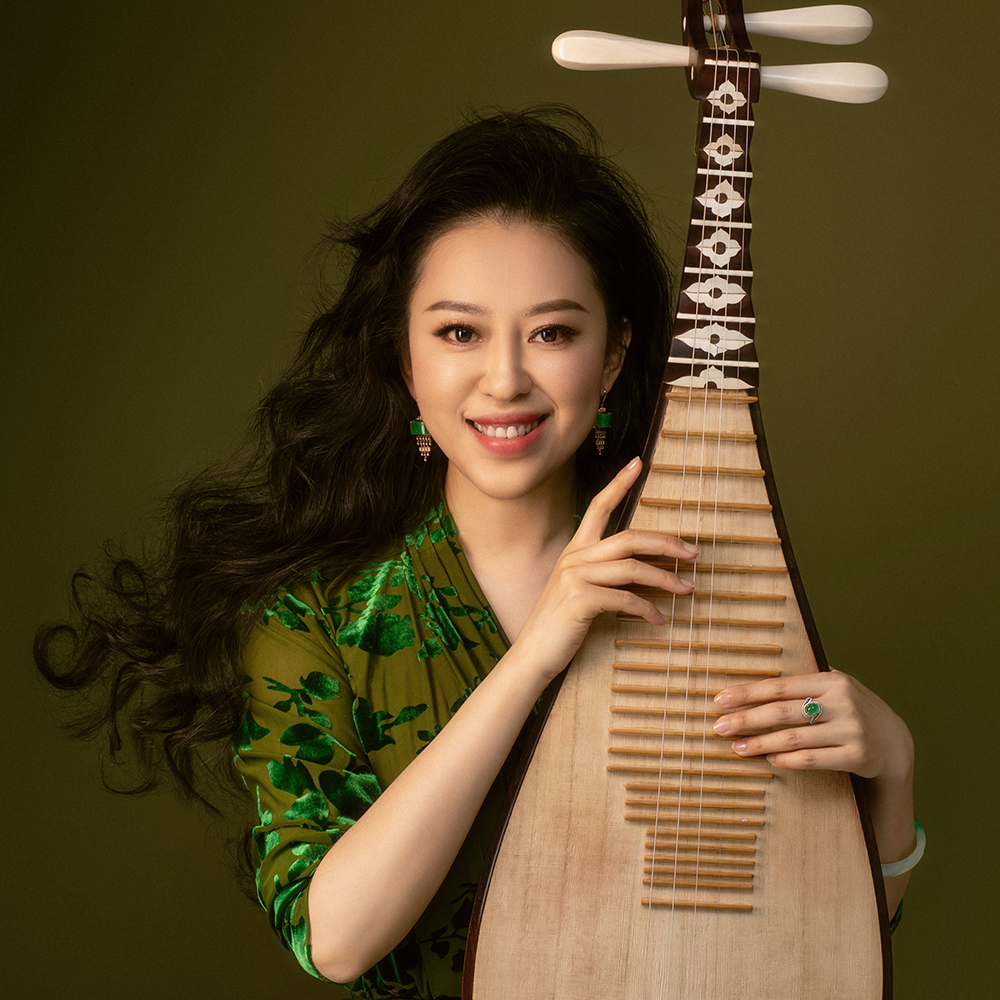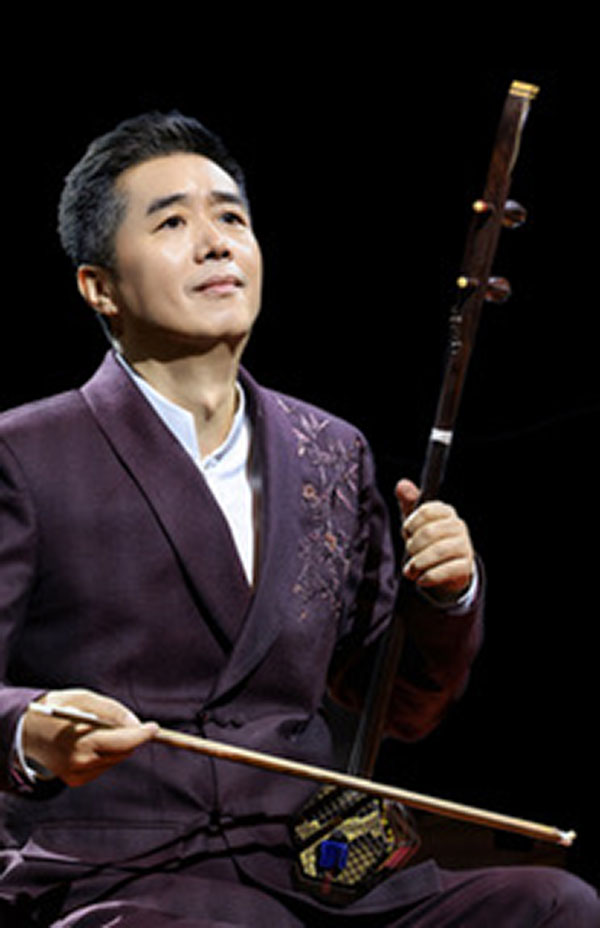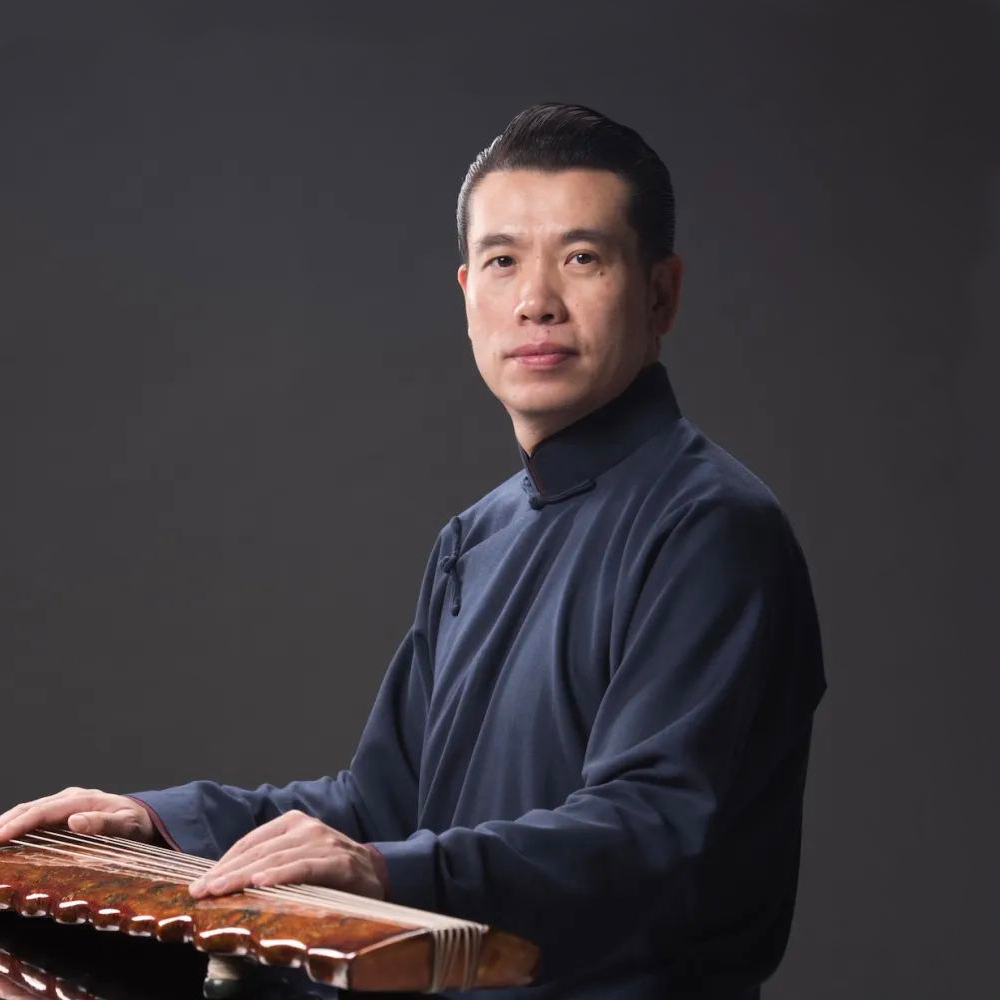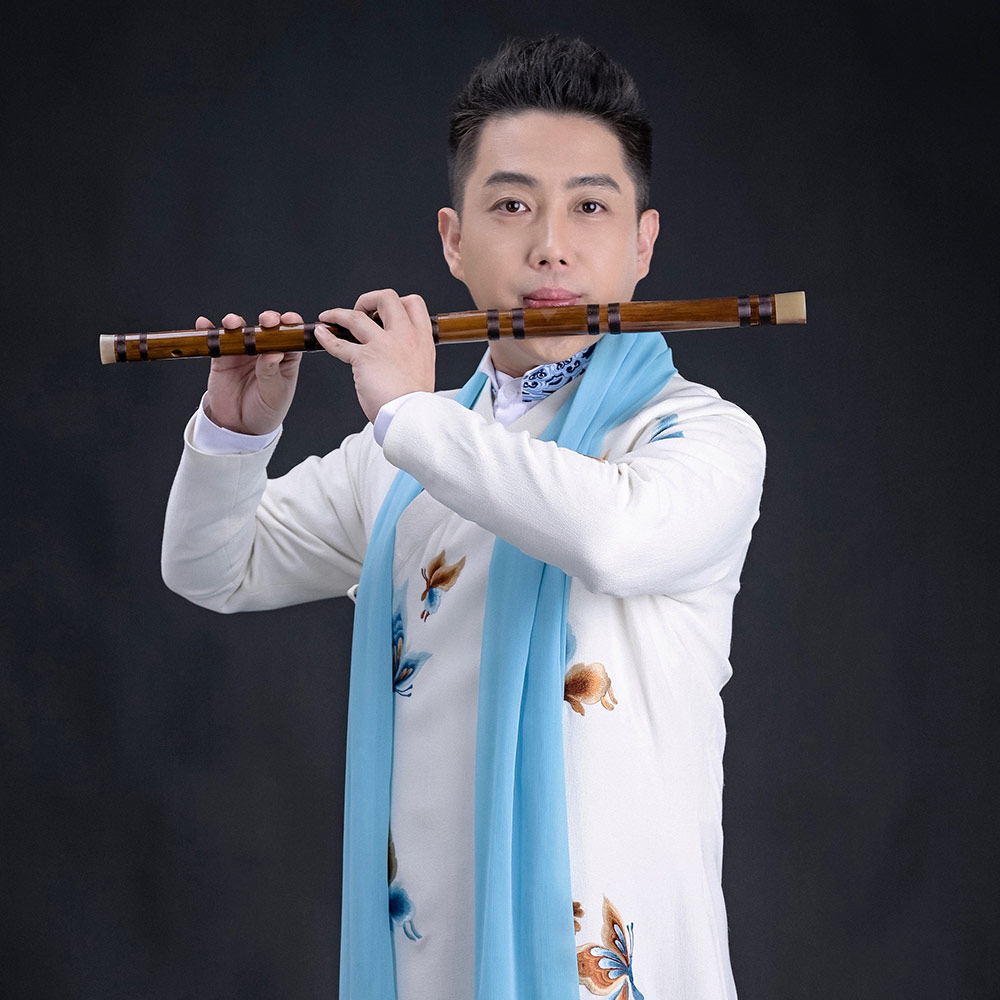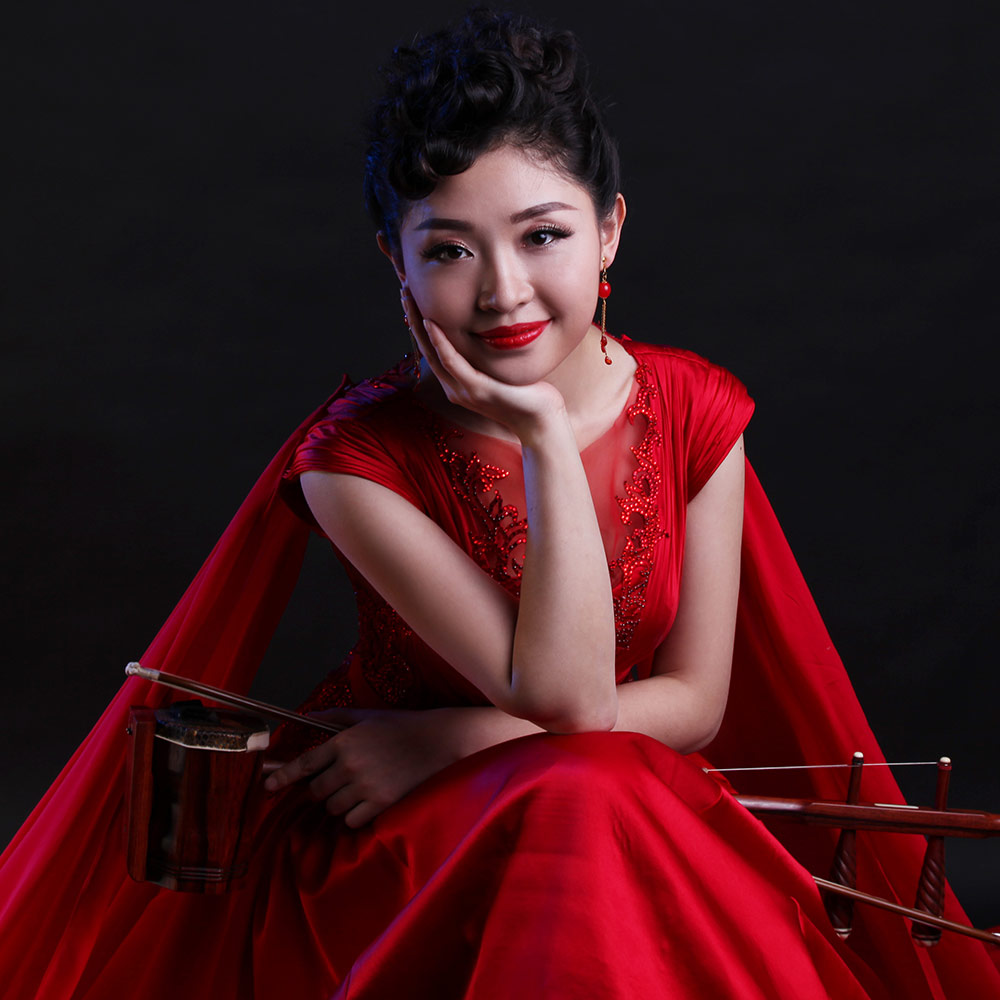ORCHESTRA: CHINA NATIONAL TRADITIONAL ORCHESTRA
The China National Traditional Orchestra (CNTO) is a state-level performing arts institution funded by the Ministry of Culture. Members of CNTO—comprising an orchestra of traditional instruments and a chorus—are highly-esteemed musicians both at home and abroad. The Orchestra was founded in 1960, CNTO’s inaugural President Li Huanzhi (January 1919 – March 2000) was an esteemed composer and Chairman of the Chinese Musicians’Association. Current president Zhao Cong is the principal pipa soloist, a musician of state honor, and National Art Fund sponsored young composer.
CNTO carries the mission of promoting China’s musical heritage. With an extensive repertoire of traditional and new works, CNTO has long contributed to the country’s cultural landscape.
CNTO actively carries out foreign cultural exchange activities, covering more than 30 countries and regions in five continents, among them the United States, the United Kingdom, France, Germany, Australia, Denmark, Spain, Norway, Columbia, Peru, Ecuador, Poland, Hungary, Slovakia, Egypt, Israel, Japan, South Korea, Singapore and Malaysia. CNTO presents the country’s cultural image, cooperates with frequent international cultural exchange activities, promotes Chinese culture and national music, and continues to make series of remarkable achievements.
In recent years, CNTO has produced such iconic full-length programmes as Impressions: Chinese Music, Rediscover Chinese Music, Looking for Dufu, Golden Echoes, Beautiful Rivers and Mountains, Grand Music from China, Bridge to Chinese Music, Cowherd and Weaver Maid, Chinese Music in Splendor, Beautiful Xinjiang, Tibetan Spring, Love Songs in the Moonlight, The Silk Road, Sun Yat-sen and Xuanzang’s Pilgrimage, the world’s first Chinese concert in drama.
The China National Traditional Orchestra adheres to a development strategy and goal focused on diverse artistic performances and ethnic development. It inherits and explores the essence of China’s traditional music culture, which spans thousands of years. Through numerous outstanding performances featuring traditional Chinese instrumental music and original ecological music compositions, the orchestra showcases a rich and colorful array of ethnic artistic forms, earning high praise from audiences both domestically and internationally.
CONDUCTOR (Vienna / Hamburg / Berlin): LI XINCAO
Chief Conductor of China National Symphony Orchestra
President of China Conservatory of Music Li Xincao
Li Xincao currently serves as the Chief Conductor of China National Symphony Orchestra, the President of China Conservatory of Music, Vice-chairman of China Musicians Association. He was chosen as one of the “100 Youths Inferential in China’s 21 Century” by “China Youth”.
Li Xincao attended both the Central Conservatory of Music and the University of Music and Performing Arts Vienna. He studied under the guidance of professors Xu Xin, Zheng Xiaoying, Li Delun, Yan Liangkun, and L. Hager.
Li Xincao gained fame at a young age, conducting the Central Orchestra and the Shanghai Symphony Orchestra at the age of 20. In 1994, he became the Principal Conductor of China National Ballet Orchestra. Since 1999, he has become the Conductor of the China National Symphony Orchestra. From 2009 to 2016, he was invited to be Music Director & Principal Conductor of the Busan Philhar monic Orchestra in South Korea.
Over the years, Li Xincao has spread music to all five continents with worldwide recognition both in the field of symphony and opera. In particular, he has led China National Symphony Orchestra for historic visits around the world, winning enthusiastic responses and high praise from authoritative music critics from all over the world.
Li Xincao is the most outstanding representative of young conductors in China.
CONDUCTOR (Düsseldorf / Dresden / Warsaw / Budapest): LIU SHA
Resident Conductor CNTO Liu Sha
A graduate of the Central Conservatory of Music, Liu pursued further studies from 2011 to 2014 at the St. Petersburg Conservatory of Music, studying opera and symphonic conducting with Alexander Polishchuk as well as researching the Ilya Musin conducting method. Among his teachers at the master classes are Seiji Ozawa, Mstislav Rostropovich, Jorma Panula, Colin Meters and Gustav Meier.
Resident conductor of the China National Traditional Orchestra, Liu Sha is widely recognized as a leading figure among the new generation of traditional orchestra conductors. To date, he has conducted the China National Traditional Orchestra on its tours to Russia, France, Korea, Switzerland, Italy, Austria, Germany and the United States. As a champion of contemporary music, he has premiered and commissioned hundreds of thousands of new works from composers of the younger generation. In the realm of symphonic music, his Russian and East European repertoire has won critical acclaim.
Mr Liu has conducted at several state visit and diplomatic occasions including APEC in 2014. He appeared in the Chinese New Year’s Concert in Hawaii in 2013 and at the Pan-Pacific Asian Arts Festival at Stanford in San Francisco. In 2015, he conducted two sold-out concerts featuring music composed by Jiang Ying at the Kennedy Centre and Carnegie Hall.
In recent years, Liu Sha has been hailed as a “dual-conductor bridging East and West,” actively exploring the development and innovation of Chinese traditional orchestras and cultivating professional conductors in the field of ethnic orchestral music. He has visually conducted and premiered nearly a thousand works for traditional orchestras. With a unique perspective, he actively advocates, commissions, and performs new works by the youngest generation of Chinese composers, gaining extensive attention in the Chinese and Asian music scenes. He is acclaimed by the media as an outstanding representative and leader of the new generation of traditional music conductors in China. In 2016, he became the youngest conductor selected among the “Top 10 Outstanding Traditional Orchestral Conductors in China”
PIPA SOLOIST: ZHAO CONG
Director of China National Traditional Orchestra
Director of China National Traditional Orchestra, principal pipa soloist, a musician of state honor, National Art Fund sponsored young composer, and a well-respected figure in the international classical music world. She is committed to promoting Chinese traditional music and has dedicated herself to the promotion of pipa art for many years in the world. Inheriting tradition and daring to innovate, she has created one after another of the first and the only, becoming an outstanding representative of Chinese musicians. She is the standing committee member and director of cultural and artistic sector of the 13th All China Youth Federation, a member of the Central Committee of the National Youth Federation, an advisor for the Art Troupe of Peking University, the first artistic visiting scholar at Stanford University, and an invited artistic visiting scholar at Cambridge University. She has been certified as an “International World Music Master” in the United States. She has served as a judge for many competitions, such as the National Art Fund, CCTV National Music Competition, and International Chinese Instrument Competition. She is among the key musicians supported by the National Art Fund. She is also a specially appointed artist for China Day at Harvard University, a distinguished professor at Fudan University in Shanghai, and was awarded the State Council’s special allowance as an expert. She is a “Cultural Celebrity” and a leader in the “Four Batches” program of talents and outstanding academic leader selected by the Publicity Department of the Chinese Communist Party. She graduated from the Central Conservatory of Music in 2000, and studied art management in a senior specialized talent training program at Peking University in 2015.
Zhao Cong has visited more than 50 countries and regions, and her music has been enjoyed by over 40 foreign state leaders. She has released several solo albums, including Carmen, Listen to China, Classic Eternity, and New Language of Pipe, and composed the pipa concerto Silk Road Flying, the pipa concerto Heaven and Earth Eternal Happiness, and the pipa suite Music Resounding in the East. In 2016, at the Memories of Hangzhou concert during the G20 Summit in China, and at other important national events, such as the 2017 “Belt and Road” International Summit, she has represented Chinese music and showcased the charm of Chinese music to the heads of state from various countries. In 2019, she participated in the 70th anniversary concert of China-Russia diplomatic relations attended by the heads of state of both countries in Moscow. The Guardian commented, “Zhao Cong’s perfect performance has filled Chinese folk music with hope”.
ERHU SOLOIST: TANG FENG
Renowned erhu performer, National First-Class Performer, Honorary Principal
Deputy Head of the China National Traditional Orchestra, recipient of the Special Allowance from the State Council, and honored as a “Cultural Celebrity” and one of the “Four Batches” of talent by the Publicity Department of the CPC Central Committee.
Tang Feng began learning the erhu at the age of 7 and graduated from the Central Conservatory of Music in 1990. In the same year, he joined the China National Traditional Orchestra. In 1996, he became the chief musician of the orchestra, making him the youngest chief musician in the history of the orchestra at the age of 28. In 1998, he was recognized as a National First-Class Performer and participated in the inaugural Chinese New Year Ethnic Music Concert in the Year of the Tiger. Between 1996 and 2002, he served as the chief musician of the Asian Orchestra, composed of orchestras from China, Japan, and South Korea.
As a soloist, Tang Feng has been invited to collaborate with renowned national orchestras such as the China Broadcasting Chinese Orchestra, Guangdong National Orchestra, Tianjin Song and Dance Theatre National Orchestra, Taipei Chinese Orchestra, Kaohsiung Chinese Orchestra, Hsinchu Youth Chinese Orchestra, Taipei Youth Chinese Orchestra, and others, both domestically and internationally.
As a chief musician and soloist, he has performed in over 30 countries and regions, with his performances spanning Europe, the Americas, Asia, and Africa. Notably, his performances in prestigious venues such as Carnegie Hall and Lincoln Center in New York, the Kennedy Center in Washington, the Berlin Philharmonic Hall in Germany, the Golden Hall in Vienna, the Champs-Élysées Theatre in Paris, the Herodes Atticus Theatre in Athens, and the Sapporo Concert Hall in Japan have attracted a wide international audience, contributing significantly to the global influence of Chinese traditional music. In 2023, at the opening ceremony of the 60th anniversary of diplomatic relations between China and Spain, he collaborated with Spanish musicians to perform “Sunshine Forever Shines on Our Friendship.” In front of the Egyptian pyramids, he performed “Horse Racing” with the China National Traditional Orchestra, receiving enthusiastic acclaim.
Tang Feng was invited to participate in the inaugural “Oriental Melody” International Music Festival organized by UNESCO in Samarkand, Uzbekistan, where he received the only instrumental performance award, the “Highest Achievement Award.” His erhu solo composition, “Mountain Song,” won the Best Composition Award at the Fule Tong Cup International Chinese National Instrumental Solo Competition.
GUQIN SOLOIST: YANG ZHIJIAN
A graduate in architecture from Tongji University, Yang Zhijian is a contemporary expert in Guqin making and playing. He is a specially invited Guqin specialist, performer, and maker at the Forbidden City.
Representative inheritor of the intangible cultural heritage project “Guqin Making Techniques” in Shanghai, Yang has dedicated himself to the protection and promotion of Guqin culture. He apprenticed under two Guqin masters: Gong Yixian, a national-level inheritor of intangible cultural heritage and former president of the China Qin Society, and Professor Li Xiangting, a national-level inheritor of intangible cultural heritage and honorary president of the China Qin Society. Yang delved into the study of classic pieces and Guqin making techniques of the Guangling and Yushan schools.
Furthermore, he studied under the renowned dizi (bamboo flute) player and “Jiangnan Xiao King” Professor Dai Shuhong, devoting himself to the exploration of Guqin and xiao (vertical bamboo flute) performance art. Yang has been involved in guqin making and research for many years, successfully restoring several renowned ancient Guqins from the Tang, Song, Yuan, and Ming dynasties. The tones of the Guqins crafted by Yang are characterized by their bold, ancient, profound, and reserved qualities, making them collectible artistic treasures.
BAMBOO FLUTE: DING XIAOKUI
Ding Xiaokui is a wind instrumentalist in the China National Traditional Orchestra, specializing in various wind instruments such as flute, xiao (vertical bamboo flute), shakuhachi, xun (Chinese clay ocarina), paixiao (pan flute), bansuri, Irish tin whistle, and more. He has achieved notable recognition, including the Silver Prize in the Flute category at the inaugural CCTV National Instrumental Music Television Competition, the Silver Prize at the 2011 Shanghai Spring International Jiangnan Sizhu Invitational Competition, and the Gold Prize for Outstanding Ethnic Folk Ensemble awarded by the Ministry of Culture in 2013.Ding Xiaokui has accompanied the China National Traditional Orchestra on numerous international tours.
Ding Xiaokui has played pivotal roles in major productions such as “Impression of Chinese Music” and “Encounter with Chinese Music,” directed by Wang Chaoge, as well as “In Search of Du Fu,” directed by Yi Liming, receiving widespread acclaim.
Dedicated to cross-genre musical exploration, Ding Xiaokui has collaborated with jazz pianist Kong Hongwei to form the Golden Buddha Jazz Band. He also joined forces with the master of zhongruan (Chinese lute), Feng Mantian, to establish the Mantian Quintet, embarking on a nationwide tour from 2019 to 2021, comprising nearly a hundred performances. Their performances have garnered appreciation at various music festivals and from musicians in Europe and the Americas.
ERHU: DUAN CHAO
Duan Chao is a renowned young Erhu performer from the China National Traditional Orchestra. She graduated from the Central Conservatory of Music with a Master’s degree in Literature. She has won numerous awards in major domestic and international competitions and has released several solo albums showcasing her exceptional Erhu skills. Having held multiple successful solo performances and large-scale Erhu concerto concerts, Duan Chao has received high praise and unanimous acclaim from audiences and critics alike.
Over the years, Duan Chao has been active on various stages both in China and internationally, performing solo at prestigious venues such as the National Centre for the Performing Arts China, the Great Hall of the People, the Forbidden City Museum, the Forbidden City Concert Hall, the Poly Theatre, and the Kennedy Center. She has played a pivotal role as an Erhu soloist in over a hundred major performances worldwide. She has toured extensively in countries including Russia, the United States, the United Kingdom, Germany, Switzerland, Austria, Greece, Spain, Egypt, Mexico, Peru, Colombia, Nigeria, Southeast Asia, and more. She has collaborated with renowned orchestras both in China and abroad, including the China National Traditional Orchestra, China National Symphony Orchestra, China Film Symphony Orchestra, North Carolina Symphony Orchestra, Taipei Chinese Orchestra, Zhuhai Chinese Orchestra, Chongqing Chinese Orchestra, and the China Youth Chinese Orchestra.



